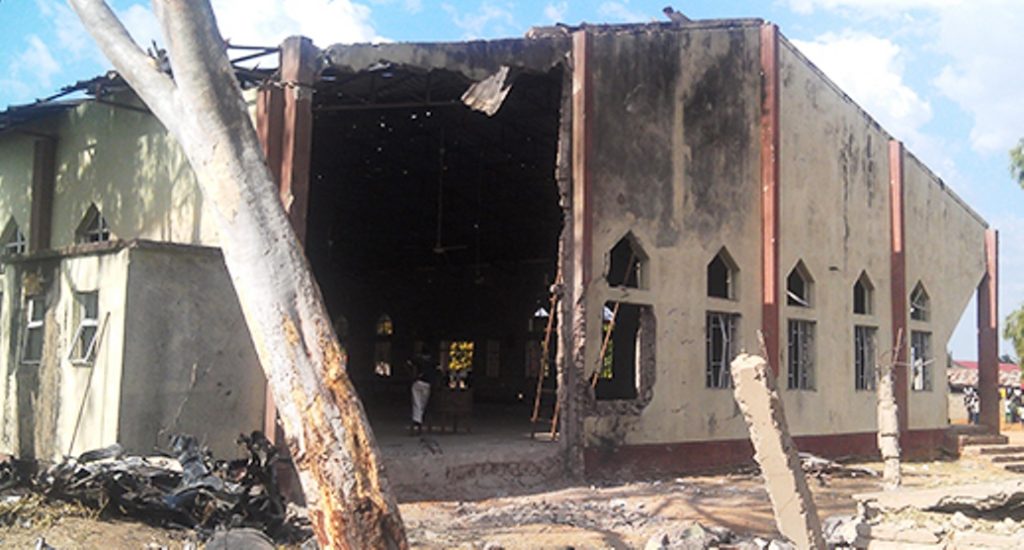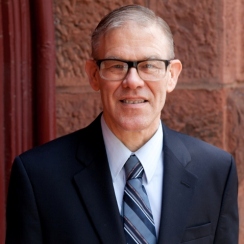An earlier article summarized a recent interview of Mark Jacob, former Attorney General of Kaduna State in Nigeria and currently a Nigerian barrister, by Robert Reilly, President of the Westminster Institute, regarding the ongoing mass murders of Christians in Nigeria, and the apparent complicity of the government of President Muhammed Buhari in the killings. Reilly then asked Robert Destro, and former Assistant Secretary of State for Democracy, Human Rights, and Labor in the Trump Administration, and currently Professor of Law at the Catholic University of America for his perspective of the current persecution in Nigeria.
Destro said that “the function of the government is to protect the physical security of the people.” He said that there is no local police in Nigeria, only a federal police force, and they do not act when people call. If local people try to defend themselves, they are arrested. He said that during the Trump Administration, he was asked by Secretary of State Mike Pompeo to try to make sense of the situation. What he discovered was a lack of recognition of physical security as the most basic of human rights. This seems to be “calculated,” he said. Polls taken in Nigeria show that the fear of kidnapping for ransom is the greatest fear that people have. He noted that in the most recent attacks in Nigeria, the attackers are destroying crops, with the obvious objective of “pushing people off the land.” He said that the situation is best described as “the government acquiesces in a major land grab by ethno-religious groups from the north and from other areas around Nigeria.”
Destro said that “getting the State Department to break out of this received narrative of climate change was literally like pulling teeth.” He said that his briefing before leaving Washington was entirely the climate change narrative, and only when he got to Nigeria did American personnel there tell him what was really happening on the ground, which was essentially what Mark Jacob described. Destro said that if herdsmen need land to graze cattle, they can rent pasture land. But the real conflict “is not a climate change issue.” He said that “the State Department is so completely wrapped up in both preserving the status quo in its relationship with the Buhari government, it seems unwilling or unable to come to grips with not only what’s happening in the north and middle belt, but also to connect the dots with what’s happening with Boko Haram and the growth of Islamic fundamentalism.”
Reilly asked “what about the effect of placing Nigeria on this list of Countries of Particular Concern?” Destro said that the Nigerian “government was not happy about it.” The big issue, Destro said, will be to look “very close” at aid being given to Nigeria, and “what it’s being used for.”
Reilly asked Jacob what the reaction in Nigeria was to placing the country on the State Department’s list of Countries of Particular Concern. Jacob said “absolutely we were relieved that for the first time the world or the United States was rejecting” the false narrative “that has been pushed across the world” by the Nigerian government “to hide the truth from the world. While religious systemic killing is ongoing, the government because of its approach and its policy of Islamization does not want that to be let out.” He said that while it was good that America finally recognized what is going on, the Nigerian government was very angry with the State Department’s action.
Reilly next asked what Christians in the south are doing to help Christians in the Middle Belt. Jacob said that people in the south are conflicted by family loyalties, as many have Muslim relatives, and therefore they want to appear evenhanded. He said that “Christian leaders even in the south will hesitate before speaking out.”
Destro said that with respect to the American government, when it comes to religious issues “people would prefer not to look.” When he was in government, his concern for the physical security of Nigerians “was translated as ‘all Destro wants to do is help the Christians.’” The desire “not to rock the boat, in calling these atrocities what they are, is really very difficult.” He said that we saw the same kind of denial of religious basis for terrorist action when ISIS appeared. In Nigeria, he said that “the country is at war with itself … the religious and ethnic components are simply not understood, because nobody talks about them.” It is quite important, Destro said, that the police protect the physical safety of every one of its citizens equally. Where this does not happen, as is the case in Nigeria, and is beginning to be the case in certain jurisdictions in the United States, what exists is a politicized justice system “that can’t really be tolerant.”
Destro then turned to the Nigerian state of Borno, which he said is the “eye of the storm” in the war prosecuted by Boko Haram. About a year ago, many international aid agencies found that they “simply cannot do business there anymore.” He said that “the governor himself has been kidnapped.”
Reilly asked about Destro’s comment that the government of Borno is encouraging the destruction of churches. The question was referred to Jacob. Jacob said this is often done by cancelling a church’s certificate of occupancy. He said that the policy in Borno, Kano, and other northeast states is that no certificates of occupancy will be given for churches or “beer drinking places.” Christians in those areas who turn to other types of buildings to hold worship services risk having those buildings torn down. The governments in these states no longer pretend that churches are being destroyed by Boko Haram, but are acting directly to prevent churches from functioning.
Destro remarked that “this is what happens when you close your eyes to the religious and ethnic dimensions of this struggle.” He said that Boko Haram now regards Borno state as “Dar-el-Islam,” or “the Land of Islam.” This means that churches have no place there. He said that not only is physical security a problem, but these is also an attempt “to push people out.” There are many “internally displaced people” in Nigeria. “The country is coming apart,” he said. Eventually, Destro said, internally displaced refugees in Nigeria will attempt to emigrate, to Europe or America.
Reilly asked how closely religious divisions are tied to tribal divisions. Jacob said that religious affiliation is tied closely to tribal affiliation. There are a few Muslims in his tribe, and there are some Hausa and Fulani Christians, but they are small minorities. In certain areas of Nigeria, one’s religion may preclude one from advancement. Riley asked if this wasn’t against Nigeria’s constitution. Jacob said that it is, but “people have gone to court” about this, and not gotten justice, because the judiciary is intimidated.
Reilly asked what hope there might be for the future. Jacob said there must be an internal reckoning, in which Nigerians decide what kind of country they want, because “we cannot go on like this.” He believes that if the Nigerian government continues with the current President’s policies “this country will break.” Reilly asked “what would be the forum for such a conversation or negotiation.” Jacob said it would have to be an inter-tribal negotiation, since the National Assembly is skewed in its representation to the north. Destro said that both the United States and European countries are effectively supporting the Buhari government, and commonly not asking hard questions. Attempts to ask those questions are met with anger by the Buhari government. So western actors in Nigeria generally stick with a narrative that avoids ethnicity, and especially, religion.
As noted at the beginning of the previous article, murder and violence against Christians with state complicity seems to be, if anything, increasing in Nigeria (a 60% increase last year and 1,470 murdered in just the first four months of 2021). The Nigeria based International Society for Civil Liberties and the Rule of Law claims 43,000 Christians murdered by Nigerian jihadist in the last 12 years, 18,500 disappeared and 17,500 churches attacked.
Perhaps the greatest awareness we should be left with from Reilly’s interviews of Jacob and Destro is that Christians are being murdered constantly in Nigeria, with no protection from the state. Indeed, the army may actively assist the jihadists, as happened with the destruction of a Christian orphanage in the northeastern Plateau State at the beginning of last month. It doesn’t come easily to Americans living in the comfort and security of life in this country to imagine what life is like knowing that one can be killed, raped, mutilated, or have one’s home, farm, or church destroyed at any moment, with no state protection likely.
Although Reilly identified Nigeria as the first democracy ever assigned the Country of Particular Concern (CPC) designation for its violations of religious freedom, one has to wonder, given Mark Jacob’s description of the on the ground political situation in Nigeria, whether it can really be classed as a democracy at this point. That situation and the personal jeopardy he claimed because of speaking out makes Nigeria appear closer to a dictatorship. Democracy is, after all, a continuum, and even hard dictatorships hold (controlled) elections and have constitutions that specify rights. Freedom House rates the country as “Partly Free,” with political, civil liberties, and overall scores about half of what they could be.
Christians should pray for the deliverance of Nigerian Christians, as the persecution there is ongoing and may even be increasing. Their plight, and the religious motive of Islamization behind it, needs to be continually highlighted to the American government and public. Aid and arms sales to the Nigerian government by America or other western countries should be contingent on very marked improvement in the rule of law, civil liberties, and state protection of its citizens from violence. Very importantly, Nigeria’s CPC designation, given in the closing days of the Trump Administration, should be maintained by the Biden Administration until there is a dramatic change in the country’s treatment of non-Muslims. Finally, Christians ought to maintain an eternal perspective on this and other situations of severe persecution. Faithfulness in times of persecution is a glory to God, and should be an inspiration to his disciples.






Comment by David on September 10, 2021 at 8:54 am
There are estimates that Nigeria will have the second largest population in the world after India by 2100. China may fall to third place.